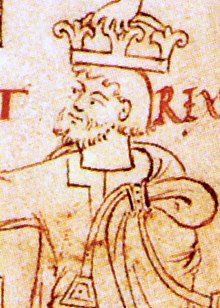

King of England
c. 990
12 November 1035 (aged around 45) Shaftesbury, Dorset, England
Incumbent
"Canute" redirects here. For other people with the given name, see Canute (given name). For the American town, see Canute, Oklahoma. "Cnut" redirects here. For the Norse King of Northumbria, see Cnut of Northumbria. For other uses, see Knut. King of England Cnut the Great (/k ə ˈ nj uː t / ; Old English: Cnut cyning; Old Norse: Knútr inn ríki; died 12 November 1035), also known as Canute, was King of England, Denmark and Norway, often referred to together as the North Sea Empire during his rule. As a Danish prince, Cnut won the throne of England in 1016 in the wake of centuries of Viking activity in northwestern Europe. His later accession to the Danish throne in 1018 brought the crowns of England and Denmark together. Cnut sought to keep this power-base by uniting Danes and English under cultural bonds of wealth and custom, as well as through sheer brutality. After a decade of conflict with opponents in Scandinavia, Cnut claimed the crown of Norway in Trondheim in 1028. The Swedish city Sigtuna was held by Cnut (he had coins struck there that called him king, but there is no narrative record of his occupation). In 1031, Malcolm II of Scotland also submitted to him, though Anglo-Norse influence over Scotland was weak and ultimately did not last by the time of Cnut's death. Dominion of England lent the Danes an important link to the maritime zone between the islands of Great Britain and Ireland, where Cnut, like his father before him, had a strong interest and wielded much influence among the Norse–Gaels. Cnut's possession of England's dioceses and the continental Diocese of Denmark—with a claim laid upon it by the Holy Roman Empire's Archdiocese of Hamburg-Bremen—was a source of great prestige and leverage within the Catholic Church and among the magnates of Christendom (gaining notable concessions such as one on the price of the pallium of his bishops, though they still had to travel to obtain the pallium, as well as on the tolls his people had to pay on the way to Rome). After his 1026 victory against Norway and Sweden, and on his way back from Rome where he attended the coronation of the Holy Roman Emperor, Cnut, in a letter written for the benefit of his subjects, deemed himself "King of all England and Denmark and the Norwegians and of some of the Swedes". The Anglo-Saxon kings used the title "king of the English". Cnut was ealles Engla landes cyning—"king of all England". Medieval historian Norman Cantor called him "the most effective king in Anglo-Saxon history".

We use cookies
We use cookies and other tracking technologies to improve your browsing experience on our website, to show you personalized content and targeted ads, to analyze our website traffic, and to understand where our visitors are coming from. Privacy Policy.